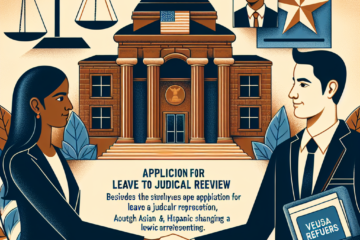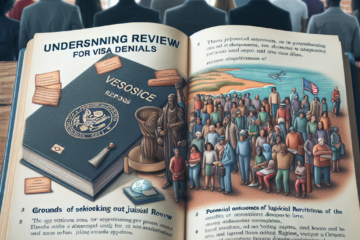Introduction
In a recent court decision, Justice Pallotta analyzed the case of Keivan Zeinali, an Iranian citizen whose study permit application for a Master’s of Business Administration (MBA) program in Canada was refused by an immigration officer. This blog post examines the key arguments raised by Mr. Zeinali, the reasoning behind the officer’s decision, and the judge’s ruling on the matter.
Table of contents
Background
Keivan Zeinali, a 32-year-old Iranian citizen, was accepted into an MBA program at Trinity Western University in British Columbia. However, his study permit application was refused by an immigration officer who doubted Mr. Zeinali’s intention to leave Canada after completing his studies.
Allegations of Unreasonableness and Procedural Unfairness
Mr. Zeinali argued that the officer’s decision was unreasonable and procedurally unfair. He claimed that the decision contained several “badges of unreasonableness” and lacked a proper assessment of his purpose of studying in Canada. Mr. Zeinali also alleged that the officer relied on extrinsic sources of information about MBA programs in Iran and did not provide him with an opportunity to respond to credibility concerns.
Reasonableness Standard of Review
The court applied the reasonableness standard of review, which requires examining the decision maker’s reasoning process and outcome. The judge clarified that the court does not substitute its own decision but focuses on whether the decision as a whole is transparent, intelligible, and justified.
Analysis of the Officer’s Decision
The court analyzed the officer’s reasons for refusing Mr. Zeinali’s study permit application, which included concerns about the high cost of international study, insufficient evidence regarding financial circumstances, and doubts about the reasonableness of pursuing an MBA in Canada. The court found that the officer’s decision was reasonable, considering the evidence presented and the officer’s role in assessing the applicant’s intention to leave Canada.
Assessment of Procedural Fairness
Mr. Zeinali argued that the decision was procedurally unfair because the officer relied on undisclosed credibility concerns and extrinsic evidence about local MBA options in Iran. However, the court concluded that there was no breach of procedural fairness as the officer’s decision was based on the sufficiency of evidence and meeting statutory requirements, rather than credibility concerns.
Judgment and Dismissal of Judicial Review
The court dismissed Mr. Zeinali’s application for judicial review, ruling that the officer’s decision was neither unreasonable nor procedurally unfair. The court found that the officer adequately considered the evidence, weighed relevant factors, and provided transparent and justifiable reasoning.
Frequently Asked Questions:
What was the reason for refusing Keivan Zeinali’s study permit application?
Why did Mr. Zeinali argue that the decision was unreasonable?
What is the reasonableness standard of review?
How did the officer assess Mr. Zeinali’s financial circumstances?
Did the court find any procedural unfairness in the officer’s decision?
Why did the officer raise concerns about Mr. Zeinali’s motivation letter?
How did the court assess the officer’s concerns about career prospects?
What factors did the officer consider regarding Mr. Zeinali’s ties to his home country?
What standard of review did the court apply in this case?
What was the outcome of the judicial review application?
Note: It is important to note that while the provided court decision has been summarized, it may be necessary to consult the original document for a complete understanding of the case.
If you would like to book a consultation book with us today.



0 Comments